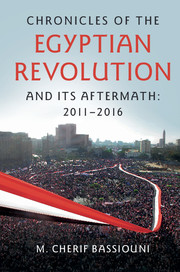Book contents
- Frontmatter
- Dedication
- Contents
- Preface
- Acknowledgments
- List of Abbreviations
- Introduction
- 1 The Early Stage of the Revolution
- 2 Mubarak Relinquishes the Presidency and the SCAF Assumes Power
- 3 A Prelude to Democracy: 2011–2012 Elections
- 4 The Morsi Presidency: June 30, 2012 to July 3, 2013
- 5 The Military's Return to Power and the El-Sisi Presidency
- 6 2015Legislative Elections and the Changing Civilian Political Landscape
- 7 The Military Institution: Its Power, Influence, and Culture
- 8 Violence and Repression
- 9 The Accountability Gap
- 10 The Justice System in Crisis
- 11 The Constitutional Quagmire
- 12 Demographics, Education, and the Economy
- 13 Geopolitical Factors
- 14 Concluding Assessment
- Pictures of the Egyptian Revolution and Related Events
- Bibliography
- Index
10 - The Justice System in Crisis
Published online by Cambridge University Press: 24 November 2016
- Frontmatter
- Dedication
- Contents
- Preface
- Acknowledgments
- List of Abbreviations
- Introduction
- 1 The Early Stage of the Revolution
- 2 Mubarak Relinquishes the Presidency and the SCAF Assumes Power
- 3 A Prelude to Democracy: 2011–2012 Elections
- 4 The Morsi Presidency: June 30, 2012 to July 3, 2013
- 5 The Military's Return to Power and the El-Sisi Presidency
- 6 2015Legislative Elections and the Changing Civilian Political Landscape
- 7 The Military Institution: Its Power, Influence, and Culture
- 8 Violence and Repression
- 9 The Accountability Gap
- 10 The Justice System in Crisis
- 11 The Constitutional Quagmire
- 12 Demographics, Education, and the Economy
- 13 Geopolitical Factors
- 14 Concluding Assessment
- Pictures of the Egyptian Revolution and Related Events
- Bibliography
- Index
Summary
HISTORICAL INTRODUCTION
In modern time, those in power have used institutions of government to consolidate their positions, while those who are not in power have resorted to the judicial system to halt or limit the abuses of those who are in power. The rule of law has therefore been about the balance between those who exercise power and the rights of individuals in a given society.
Egypt, like other societies in the world, has been in quest for this balance since the establishment of the modern Egyptian judiciary in the early 1920s. The 1923 Constitution established the judicial branch as a separate and independent branch of government. Since then, the Egyptian judiciary's professionalism and individual independence, both as an institution and regarding its members’ independence in the exercise of their official functions, have been well established, even though there are periods where those in power sought to bend the judiciary to their purposes. Judges, to their credit, have always resisted.
Historically, Muslim and Coptic judges sat side by side, administering justice to all. Training programs were established, and later a National Judicial Center was founded to train new judges and to advance research, though regrettably not always or sufficiently supported by the executive, which controls the Judiciary's budget. The counterpart of the civilian nonsectarian judiciary was the Sharicā courts. These courts dealt with matters of personal relations for Muslims (such as marriage, divorce, and inheritance), which were decided by Sharicā judges, who were graduates of Al-Azhar University, a theological institution that is more than one thousand years old, and who applied Sharicā law to Muslims. A judicial school for Sharicā judges was established at Al-Azhar in 1908. With respect to non-Muslims, each religious denomination, such as Copts, Catholics, and Jews, had its own separate religious system, but only with respect to issues of personal relations. As of 1955, the Sharicā courts were abolished and issues of personal relations became subject to ordinary civil courts, though religious issues were left to religious sectarian courts. Everything else was subject to the ordinary civilian courts that dealt with civil, criminal, commercial, and administrative legal issues. Trials courts were under appellate courts that reviewed their decisions. All such decisions were subject to the highest review before the Court of Cassation.
- Type
- Chapter
- Information
- Publisher: Cambridge University PressPrint publication year: 2016



